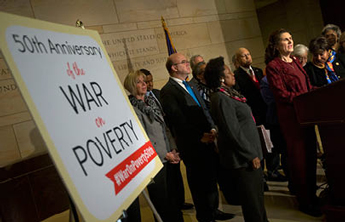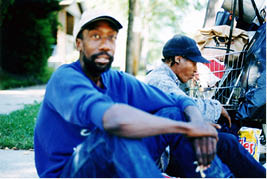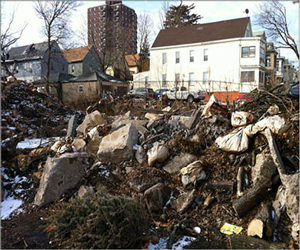
It was 50 years ago in January that President Lyndon B. Johnson announced the time had come to wage a War on Poverty. His presidential declaration was followed up with more support for programs that assassinated President John F. Kennedy had created to tackle problems of hunger, job training and job creation. President Johnson’s “unconditional war on poverty in America” would include legislation that created offices to help curb the problem and support programs like Head Start, Legal Services, Job Corps, Volunteers in Service to America and food stamps.
But by 1968 it was clear that the country could not fight a war on poverty at home and a war in Vietnam abroad. Dr. Martin Luther King, Jr. was among leaders and activists who condemned U.S. militarism. He called on the country to scale back its military excursions and invest more in opportunity and progress inside America. His calls went unheeded and many condemned him for linking civil rights with U.S. foreign policy.

Though the idea of a War On Poverty was initially met with support, the good feeling evaporated relatively quickly and programs were dismantled with Republican Presidents Richard Nixon and Gerald Ford leading the way. Later the “welfare queen” myth was exploited by Ronald Reagan in seeking and winning the White House. The anti-poverty programs were derided as giveaways for poverty pimps and rewards for Black people who wanted to do nothing.
Later New Democrat Bill Clinton touted welfare reform as a major part of his 1992 campaign and pushed so-called reforms forward. But like other promises, his vow to provide educational opportunity, child care and other supports to poor mothers who depended on welfare fell short.
While poverty and ending poverty have been convenient footballs in American politics, in recent elections, poverty and the poor hardly get any mention at all. And while many want to claim some affinity for Dr. King and give speeches in his name, these political chameleons are more concerned with maximum political impact or fallout than creating maximum opportunities for people to enjoy a decent standard of living in this country.
Today official poverty remains at almost the same level as 50 years ago, about 15 percent. Forty-six million Americans live in poverty and 1 in 7 households don’t have enough food, according to povertyusa.org.
According to the Pew Research Center, most poor Americans are in their prime working years, ages 18 to 64. Far fewer elderly are poor but childhood poverty persists and has risen since the 2007-08 financial crisis, the center reported Jan. 13.

“By 2012, poverty among African-Americans had fallen to 27.2 percent–still more than double the rate among Whites (12.7 percent, 1.4 percentage points higher than in 1966),” according to the center’s “Who’s poor in America? 50 years into the ‘War on Poverty.’ ”
“Actually the poverty rate increased between 2005 and 2012 for every demographic of African Americans except those ages 65 and over who experienced a decrease from 21.2 percent to 19 percent. Black families with children under 18 headed by a single mother have the highest rate of poverty at 47.5 compared to only 8.4 percent of married-couple Black families,” noted BlackDemographics.org.
Hard-core poverty is more likely to entrap Black children and Black children born into the middle class are more likely to fall back into poverty, according to experts.
What is needed is not reliance on a government program nor appeals to a society that has shown it has little use for moral appeals. What America understands are people organized and working for their own survival and their own success. What America understands are people organized and willing to exert political influence and punish political enemies regardless of party or location. What America fears is a concerted Black effort rooted in a determination to be fully free and willing to pay the price for such freedom. Our combined organizational and political strength along with our economic and social prowess can resolve most of our problems but it starts with us. It starts with us sacrificing to combat poverty and harnessing $1 trillion in spending power. We can’t give away nearly 90 percent of what we have and then blame White people for 100 percent of our problems. We can’t stay loyal to political parties and politicians, who aren’t loyal to us and quickly discard our interests to achieve their political aims. We can’t back political leaders who are afraid to lead and fight for our interests, and whose major concern is their personal political survival. We can’t be apathetic and then wonder why we can’t get anything done.
So the War on Poverty must be fought on two levels: We need to pool our social, intellectual and spiritual resources and to support the Economic Blueprint, economicblueprint.org, or mail donations to Muhammad Economic Blueprint, C/O Seaway Bank & Trust Company, P.O. Box 19522, Chicago, IL. 60619-9522 Attn: Sherlyn Russell. And we need to embrace the power that unity will give us, we have already seen and felt the impact of collective suffering.












